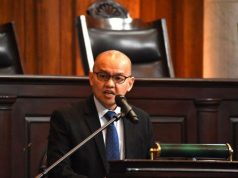
Outgoing Supreme Court Chief Justice Teresita de Castro is leaving the judiciary after having instituted a number of reforms in her less than two-month term as the chief magistrate.
De Castro, who is retiring from the high court in October 2018 after reaching the compulsory age of 70, received a Certificate of Appreciation signed by Senior Associate Justice Antonio Carpio and other judiciary officials at a flag raising ceremony at the Supreme Court complex on Monday.
She was appointed to the post late in August 2018.
As she bows out, De Castro is set to receive the full benefits of a retired chief justice. The STAR reported that De Castro’s retirement package will be based on her last salary, which was likely in the upper limit of P233,857 to P264,721 range. She will receive a pension around 50 percent higher than what she would have received as an associate justice.
During a speech, she said that she intended to dedicate the last months of her judiciary career to improving the lives of those employed in the judiciary.
“I’ve tried my best so that my presence would be most felt not only for members of the court but also judges nationwide,” De Castro said in a speech broadcast on television.
Critics have claimed that De Castro’s appointment was a reward for speaking out against her ousted predecessor Maria Lourdes Sereno during the latter’s impeachment trial in 2017.
Teresita De Castro will be remembered as the second female Chief Justice of the Philippines who got her position through politicking and submissiveness to an aggressive tyrant.
The "senior" whose bruised ego cannot accept that someone younger is equally capable, or even better.
— Justin Dizon ⚡️ (@jjcdizon) October 8, 2018
There’s pictures going around of CJ Teresita de Castro having fans who “love” her. She didn’t even serve long enough to give people the opportunity to even bat an eye.
— Kevin Panuelos (@kmp091) October 8, 2018
Sereno and De Castro are known to have butt heads in the past, with De Castro being critical of Sereno for accepting the chief justice appointment despite not being the most senior justice at the time of her appointment.
De Castro was one of the justices who voted to grant the quo warranto petition that ousted Sereno in May 2018. She participated in the 8-6 vote despite a motion from the Sereno camp calling for De Castro and four other associate justices to inhibit from deciding on the case.
’32 reforms and programs’
De Castro following her appointment to the post in August 2018 said she intended to organize the ethical standards committee of the judiciary, but there has been no update on the initiative.
Most of De Castro’s reported reforms and programs focused on improving legal services by the judiciary and salary and benefit reforms for its employees.
In early September 2018, De Castro approved a salary hike for first-level court judges from Salary Grade 26 and 27 to Salary Grade 28.
The salaries of judges of municipal trial courts, municipal circuit trial courts, Shari’a circuit courts, and municipal trial courts will thus be increased from P104,000 and P112,000 to P127,000.
De Castro also greenlighted a salary hike for lower-level court employees such as stenographers and mediators. The mediators’ fee was increased from P1,150 to P1,500.
Apart from the salary hike, she also pushed for additional cost of living allowance for justices, judges, officials and employees for the month of August as well, along with an additional grant of rice subsidy allowance for the first and second quarters of this year.
She also approved a new rule for direct payment of legal fees through over-the-counter payment in Land Bank of the Philippines branches.
The approval of a number of expansion programs in the judiciary also came during her brief stay: the construction of new halls of justice in Cagayan and Tanay, Rizal and the launching of a “Justice Zone” in Cebu City.
She also supervised the creation of technical working groups on planning, budgeting, data reconciliation and evidence management system in the judiciary.
During her previous application for the chief justice position in 2012, De Castro said that she would develop a system for solving congestion in the court docket system and suggested that the Rules of Procedure be reviewed to find a way to streamline court processes.
There are still no reports on whether De Castro was able to include her past plans in the initiatives she started during her 41 days as chief justice.
No big cases decided
One high-profile petition was filed with the Supreme Court during De Castro’s term—that by a number of opposition leaders calling for the revocation of the Philippines’ withdrawal from the Rome Statute that created the International Criminal Court.
Despite having presided over the oral arguments on the petition, De Castro will no longer cast her vote due to her retirement.
She questioned the litigants if there was already implementing legislation in the Philippines that made the Rome Statute in full force and effect in the country.
De Castro has spent around 45 years of her legal career in the government service, having started out as a member of the staff of the late justice Fred Ruiz Castro after passing the bar.
She was appointed as a justice of the Sandiganbayan in 1997, and ten years later was appointed to the high court.








